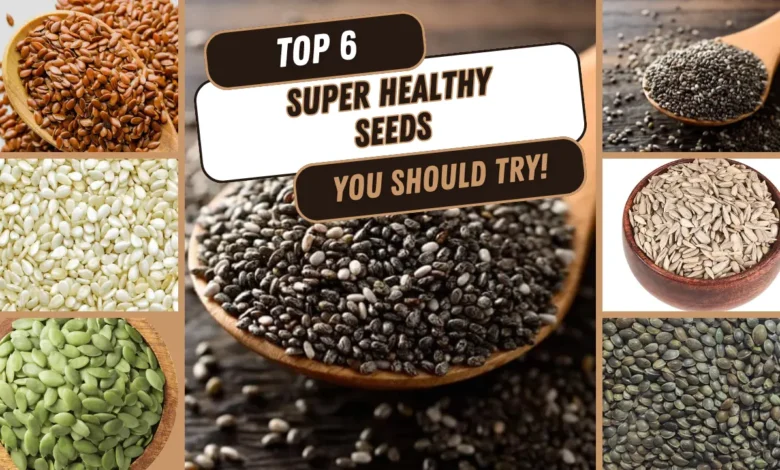6 Super Healthy Seeds You Need in Your Diet
Seeds are tiny nutritional powerhouses packed with essential nutrients like fiber, healthy fats, vitamins, and minerals. Adding these super healthy seeds to your diet can help reduce the risk of heart disease, lower blood sugar, and support overall health. This article will explore the benefits of six nutritious seeds you should consider including in your meals.

1. Flaxseeds
Flaxseeds are one of the best sources of omega-3 fatty acids, especially alpha-linolenic acid (ALA), which helps reduce inflammation and supports heart health. They are also rich in fiber, promoting healthy digestion and helping lower cholesterol levels. However, since humans can’t digest their fibrous shell, ground flaxseeds are more beneficial than whole seeds.
Nutritional Value per 28 grams:
- Calories: 152
- Fiber: 7.8g
- Omega-3 fats: 6.5g
- Magnesium: 28% of the RDI
Flaxseeds may reduce blood pressure, lower LDL cholesterol, and potentially reduce cancer risk due to their lignan content, which acts as an antioxidant.
2. Chia Seeds
Chia seeds, known for their high fiber and omega-3 content, are another superfood for heart and digestive health. These tiny seeds absorb water and expand, making you feel fuller for longer, aiding in weight management.
Nutritional Value per 28 grams:
- Calories: 137
- Fiber: 10.6g
- Omega-3 fats: 4.9g
- Magnesium: 30% of the RDI
Chia seeds can reduce blood sugar levels and inflammation, making them excellent for people with diabetes. They also help in reducing cholesterol and supporting heart health.
3. Hemp Seeds
Hemp seeds are a fantastic source of plant-based protein, containing all nine essential amino acids. This makes them a complete protein, a rare quality in plant-based foods. Additionally, they have an ideal balance of omega-6 to omega-3 fatty acids, supporting skin and heart health.
Nutritional Value per 28 grams:
- Calories: 155
- Protein: 8.8g
- Omega-6 fats: 10.7g
- Magnesium: 45% of the RDI
Hemp seeds’ anti-inflammatory properties can help improve conditions like eczema and reduce symptoms of heart disease by lowering cholesterol.
4. Sesame Seeds
Sesame seeds, often found in tahini, are packed with antioxidants like lignans, especially sesamin, which can help reduce inflammation and support hormone balance. They also contain essential minerals like copper and magnesium.
Nutritional Value per 28 grams:
- Calories: 160
- Fiber: 3.3g
- Copper: 57% of the RDI
- Magnesium: 25% of the RDI
Sesame seeds are known to lower cholesterol, reduce oxidative stress, and may help alleviate arthritis symptoms due to their anti-inflammatory properties.
5. Pumpkin Seeds
Pumpkin seeds are an excellent source of magnesium, phosphorus, and healthy fats. They are also known for their high levels of phytosterols, plant compounds that support heart health by reducing cholesterol levels.
Nutritional Value per 28 grams:
- Calories: 151
- Protein: 7g
- Omega-6 fats: 6g
- Magnesium: 37% of the RDI
Studies have shown that pumpkin seeds may help prevent bladder stones, improve prostate health, and even reduce the risk of breast cancer.
6. Sunflower Seeds
Sunflower seeds are rich in vitamin E, which acts as a potent antioxidant to protect your cells from damage. They are also packed with healthy fats, fiber, and protein, which help support cardiovascular health.
Nutritional Value per 28 grams:
- Calories: 164
- Fiber: 2.4g
- Omega-6 fats: 6.4g
- Vitamin E: 47% of the RDI
These seeds can reduce inflammation, lower cholesterol levels, and support overall heart health. Regular consumption has been linked to reduced markers of inflammation, particularly in people with cardiovascular risk factors.
What will happen ?
Adding these six super healthy seeds—flaxseeds, chia seeds, hemp seeds, sesame seeds, pumpkin seeds, and sunflower seeds—to your diet can significantly boost your overall health. They are rich in nutrients, promote heart health, aid in digestion, and may even reduce the risk of certain cancers. Incorporating them into smoothies, salads, or baked goods is an easy way to get their full benefits.
Top 5 FAQs About Healthy Seeds








